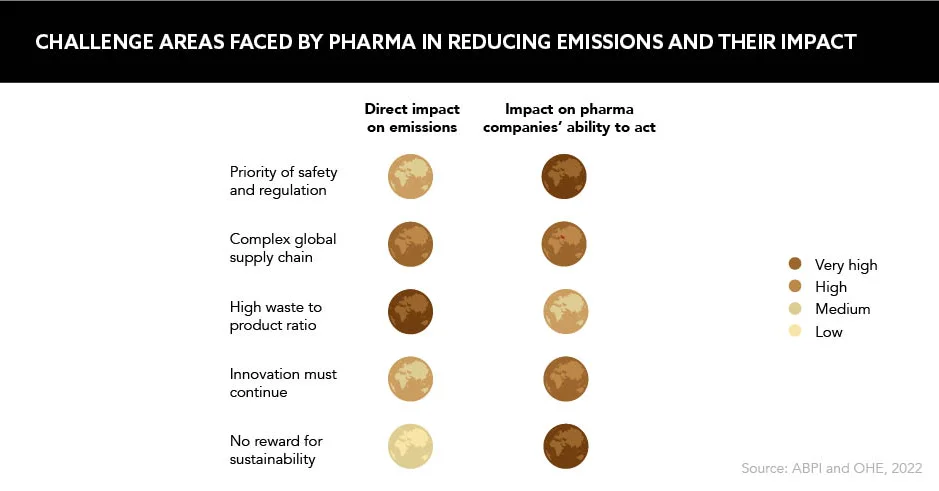With climate change pressures mounting, the pharmaceutical industry has come a long way in its efforts to reach net zero, but challenges remain. What is pharma doing to combat carbon emissions, and what else needs implementing to ensure targets are met?
Words by Danny Buckland
The pharmaceutical and life sciences sector is coming under increased scrutiny as the world wrestles with climate change and intensifies its demands on the industries heavy on carbon emissions.
If the health sector was a country, it would be the fifth highest carbon emitter in the world and, although this is spread across the entire supply chain, including pharma, its performance came into sharp focus at the recent COP27, which renewed high level political commitment to arresting global warming.
Layers of pressure are bearing down on industry, and failure to comply will generate ethical condemnation, reputational damage and a punch to the bottom line as healthcare systems and governments insist on sustainable practices.
Preliminary steps
The United Nations Development Programme (UNDP) – a regional hub for 128 nations – recently pledged to use its $6bn annual purchasing power to leverage improvements in sustainability while the NHS in England has given suppliers five years to fall in line with its plans to hit carbon net zero in 2045.
Ian Milimo, Project Manager, UNDP, used his keynote address at the recent CMS Global Life Sciences and Healthcare Forum 2022 to make it clear that the organisation would direct its business away from suppliers with high carbon footprints. “It’s very clear that the health sector has been one of the leading emitters of carbon dioxide in many of its value chains,” he says.
If the health sector was a country, it would be the fifth highest carbon emitter in the world
Extreme climate conditions were putting extra pressures on healthcare systems, he adds, with a rise in weather-induced diseases, allergies, respiratory and vascular conditions, and a roll back of health gains over the last generation with morbidity and mortality levels climbing. Milimo concludes: “Climate change is with us, and we need to make sure that we wake up to this crisis that we’re facing and begin to address those things that are within our means.”
Gathering momentum
Pharma is responding to the challenge with novel energy-saving initiatives, the use of AI to replace heavy processes and even the deployment of drones to reduce transportation pollution.
Katie Murray, Technical Director, Medicines Manufacturing Innovation Centre (MMIC), believes that companies can generate a cascade effect through their supply chains by setting sustainability targets. “It will drive behaviour change and an expectation of what suppliers have to do,” she says. “There’s already momentum from the large pharma companies and that is gathering pace.”
CPI – a deep tech innovation catalyst for industry, academia and funders, which leads the MMIC – highlights that the pharma industry has 55% higher emissions rates than the automotive industry and, in response, has launched a series of what it calls ‘grand challenges’ to reduce industry pollution. These include digital tools to modify carbon-heavy processes and minimising manufacturing waste by operating on a ‘just in time’, rather than a ‘just in case’, principle.
“Digital tools can mean faster process development with [fewer] physical experiments, which will reduce carbon footprints because you are using less material and less energy,” says Murray. “By applying digital twins, digital monitoring, AI and machine learning you also get a better, more optimised process.”
The challenging supply chain
The positive response stretches across the whole spectrum from big pharma to start-ups, but there are mountainous challenges in dealing with energy and water consumption, waste management and sourcing active pharmaceutical ingredients to shrink supply chains.
Jane Wood, Sustainable Sourcing Lead, Accord Healthcare, which supplies medicines to 80 different countries and one in five of all generic medicines to the NHS, says the company supply chain was “complex and volatile” but that suppliers are subject to a code of conduct to minimise environmental impact. They are also further encouraged to follow sustainable initiatives by swapping air cargo for road or sea freight, consolidating orders and reducing packaging waste.
There’s already momentum from the large pharma companies and that is gathering pace
“We see benefits in more consolidated and efficient order patterns with our overseas suppliers, as well as supply chain efficiencies, however it is much more than that and goes beyond what we do as a pharmaceutical company,” says Wood. “We care about the impact our activities have on the world around us and corporate responsibility is fundamental to our company purpose and our success as an organisation.”
However, she also underscores the challenge all of pharma faces, adding: “We are continuously working to implement sustainable best practice within our full supply chain, however, due to the breadth and number of our outreach, this is a work in progress. Our current focus is on education and knowledge sharing with our key partners.”
The future is bright?
Legal and regulatory pressures are likely to increase and place strain on R&D programmes and supply chain compliance. A recent report by the Association of the British Pharmaceutical Industry and published by the Office of Health Economics (OHE) advocates a close relationship between pharma companies, governments and health systems to secure a brighter, cleaner future.
“We cannot continue to develop lifesaving therapies in a vacuum. Global action must be taken to ensure that we do not save lives by killing the planet,” states Graham Cookson, Chief Executive, OHE, and report co-author.
The pharmaceutical industry cannot lose sight of its prime aim to save lives and improve health, but it has to act, and as Wood observes: “Only by working together can we achieve greater change.”







